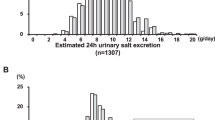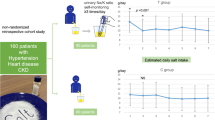Abstract
The purpose of the present study was to investigate the long-term compliance with salt restriction in Japanese hypertensive patients. Subjects included 389 patients, 230 women and 159 men, mean age 58±11 years, who underwent successful 24-h home urine collection more than three times over an interval of a year. Urinary salt, potassium, and creatinine were measured. Additionally, family history, habitual alcohol intake, smoking habit, physical activities, and job status were assessed by use of a questionnaire. During the follow-up period (average 3.5 years), participants underwent urine collection 4.6 times in average. Urinary salt excretion at the last visit was significantly lower than that at the first visit (8.7±3.4 vs. 9.6±4.1 g/day; p<0.01). Urinary potassium excretion also decreased significantly during this period (from 2.0±0.7 to 1.9±0.7 g/day; p<0.05). Among the mean 4.6 urine collections, 45.2% (men 34.6%, women 52.6%) of the patients successfully achieved <6 g (100 mmol of sodium)/day of salt excretion on at least one occasion. The rate of achievement of averaged urinary salt excretion <6 g/day dropped to 10.3% (men 4.4%, women 14.3%). Only 2.3% (men 0.6%, women 3.5%) of the patients achieved <6 g/day on all occasions. There were no significant differences in age, habitual alcohol intake, smoking habit, physical activities, or job status between patients who complied with the salt-restricted diet and those who did not. Results suggest that long-term compliance with salt restriction is poor in Japanese hypertensive patients. Since no specifically defining characteristics were found in the compliant patients, repeated measurements of urinary salt excretion seem to be important to encourage salt restriction.
Similar content being viewed by others
Article PDF
References
Cailar G, Ribstein J, Mimran A : Dietary sodium and target organ damage in essential hypertension. Am J Hypertens 2002; 15: 222–229.
Antonios TFT, MacGregor GA : Salt intake: potential deleterious effects excluding blood pressure. J Hum Hypertens 1995; 9: 511–515.
Altshul AM, Grommet JK : Food choices for lowering sodium intake. Hypertension 1982; 4 ( Suppl): III116–III120.
Alli C, Avanzini F, Bettelli G, et al: Feasibility of a long-term low-sodium diet in mild hypertension. J Hum Hypertens 1992; 6: 281–286.
Intersalt Cooperative Research Group : Intersalt: an international study of electrolyte excretion and blood pressure. Result for 24 hour urinary sodium and potassium excretion. BMJ 1988; 297: 319–328.
Yamori Y, Liu L, Mu L, et al: Diet-related factors, educational levels and blood pressure in a Chinese population sample: findings from the Japan-China Cooperative Research Project. Hypertens Res 2002; 25: 559–564.
Haddy FJ, Pamnani MB : Role of dietary salt in hypertension. J Am Coll Nutr 1995; 14: 428–438.
Korhonen MH, Järvinen RMK, Sarkkinen ES, Uusitupa MIJ : Effects of a salt-restricted diet on the intake of other nutrients. Am J Clin Nutr 2000; 72: 414–420.
Korhonen MH, Litmanen H, Rauramaa R, Väisänen SB, Niskanen L, Uusitupa MIJ : Adherence to the salt restriction diet among people with mildly elevated blood pressure. Eur J Clin Nutr 1999; 53: 880–885.
Appel LJ, Espeland MA, Easter L, Wilson AC, Folmar S, Lacy CR : Effects of reduced sodium intake on hypertension control in older individuals. Arch Intern Med 2001; 161: 685–693.
Chobanian AV, Bakris GL, Black HR, et al: Seventh report of the Joint National Committee on Prevention, Detection, Evaluation, and Treatment on High Blood Pressure. Hypertension 2003; 42: 1206–1252.
Ministry of Health, Labour and Welfare, Japan : The National Nutrition Survey in Japan, 2002. Tokyo, Dai-ichi Shuppan Press, 2004, p. 182.
Ohta Y, Tsuchihashi T, Ueno M, Onaka U, Tominaga M, Eto K : Relationship between the awareness of salt restriction and the actural salt intake in hypertensive patients. Hypertens Res 2004; 27: 243–246.
Tochikubo O, Uneda S, Kaneko Y : Simple portable device for sampling a whole day's urine and its application to hypertensive outpatients. Hypertension 1983; 5: 270–274.
Liu L, Mizushima S, Ikeda K, et al: Comparative studies of diet-related factors and blood pressure among Chinese and Japanese: results from the China-Japan cooperative research of the WHO-Cardiac study. Hypertens Res 2000; 23: 413–420.
Yoshiike N, Matsumura Y, Iwaya M, Sugiyama M, Yamaguchi M : National nutrition survey in Japan. J Epidemiol 1996; 6: S189–S200.
Nakagawa H, Morikawa Y, Okayama A, et al: Trends in blood pressure and urinary sodium and potassium excretion in Japan: reinvestigation in the 8th year after the Intersalt study. J Hum Hypertens 1999; 13: 735–741.
Hashimoto J, Imai Y, Minami N, et al: Compliance with long-term dietary salt restriction in hypertensive outpatients. Clin Exp Hypertens 1994; 16: 729–739.
Miura S, Yamaguchi Y, Urata H, et al: Efficacy of a multicomponent program (Patient-Centered Assessment and Counseling for Exercise plus Nutrition [PACE+ Japan]) for lifestyle modification in patients with essential hypertension. Hypertens Res 2004; 27: 859–864.
Fodor JG, Whitmore B, Leenen F, Larochelle P : Recommendations on dietary salt. CMAJ 1999; 160: S29–S34.
Author information
Authors and Affiliations
Corresponding author
Rights and permissions
About this article
Cite this article
Ohta, Y., Tsuchihashi, T., Onaka, U. et al. Long-Term Compliance with Salt Restriction in Japanese Hypertensive Patients. Hypertens Res 28, 953–957 (2005). https://doi.org/10.1291/hypres.28.953
Received:
Accepted:
Issue date:
DOI: https://doi.org/10.1291/hypres.28.953
Keywords
This article is cited by
-
Current prescription status of antihypertensive drugs with special reference to the use of diuretics in Japan
Hypertension Research (2017)
-
Add-on effect of hydrochlorothiazide 12.5 mg in Japanese subjects with essential hypertension uncontrolled with losartan 50 mg and amlodipine 5 mg
Hypertension Research (2015)
-
Relationship between salt intake as estimated by a brief self-administered diet-history questionnaire (BDHQ) and 24-h urinary salt excretion in hypertensive patients
Hypertension Research (2015)
-
Long-term variability of urinary salt excretion and blood pressure in hypertensive patients
Hypertension Research (2014)
-
High salt intake promotes a decline in renal function in hypertensive patients: a 10-year observational study
Hypertension Research (2013)



